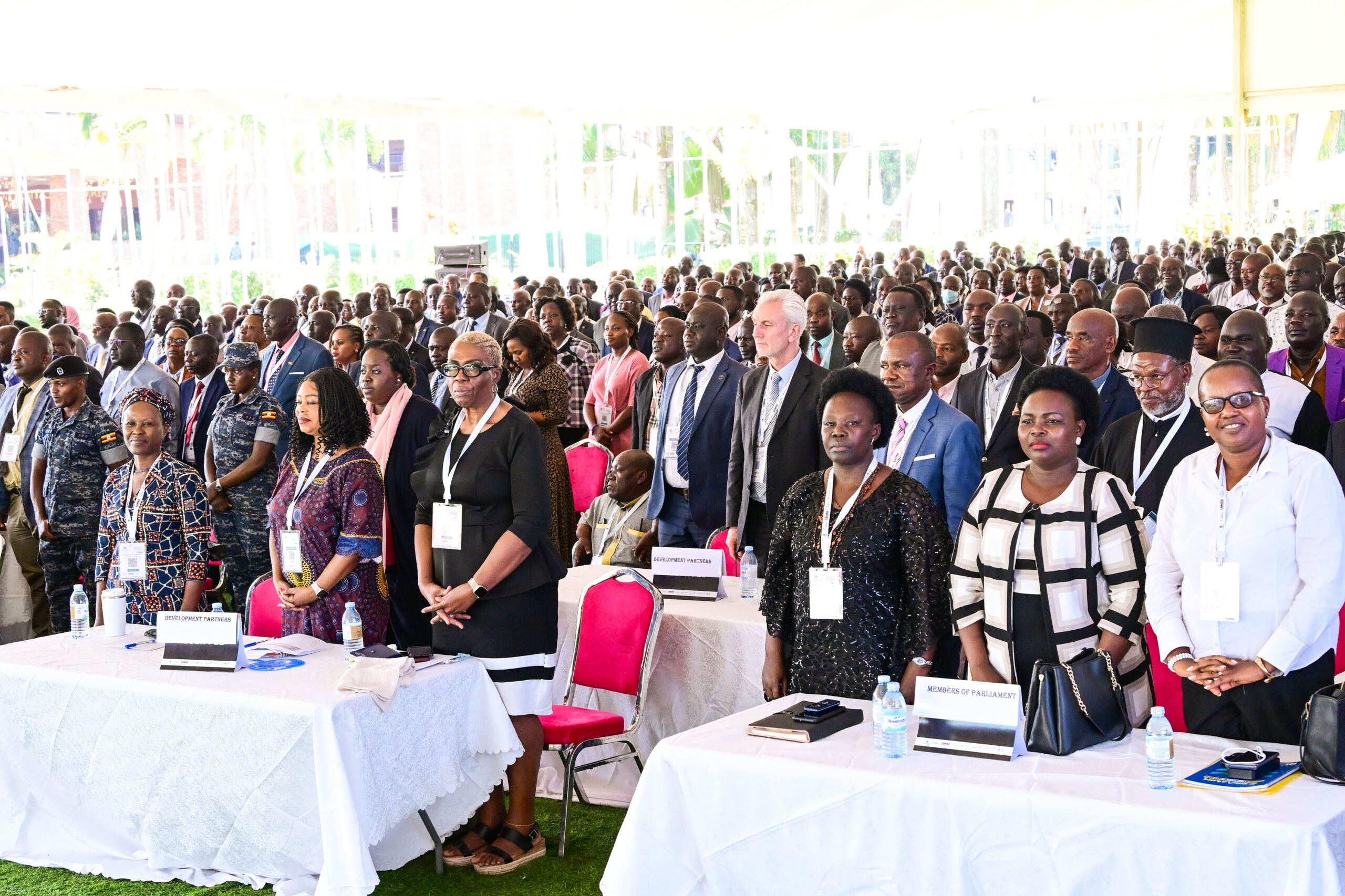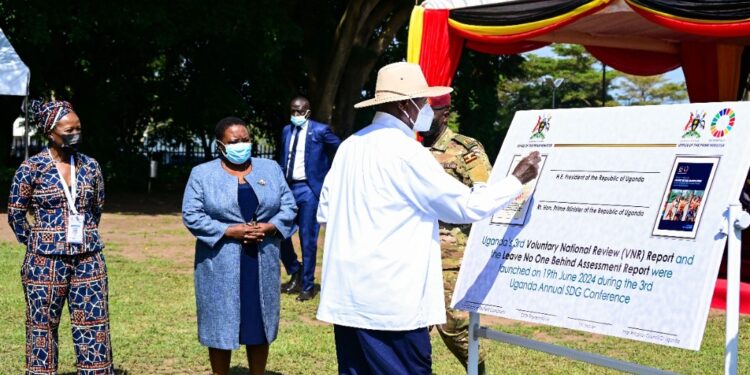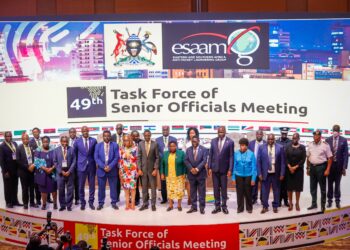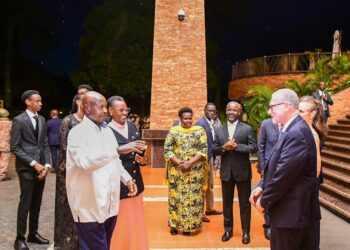President Yoweri Kaguta Museveni has directed people who stay and operate in wetlands to vacate them peacefully.
“I have been seeing some scuffle between the National Environment Management Authority (NEMA) and some people who are in the wetland. My advice to the people in the wetland is that they should all leave peacefully. I have been seeing people commenting that where was NEMA when these people were putting up these buildings? Why didn’t they stop them? But why should it be NEMA stopping these people? Don’t you have eyes to see a swamp? You don’t need NEMA, who doesn’t know what a swamp is, why do you need NEMA to stop you as if you are an idiot? But even NEMA should not take on that responsibility, because they don’t have enough manpower,” he said.
The President made the remarks today while officiating at the 3rd Annual Sustainable Development Goals (SDGs) Conference and Dissemination of the Local Government Management of Service Delivery Report and Parish Development Model (PDM) Implementation held at Speke Resort, Munyonyo.
The two-day conference was attended by Resident District/City Commissioners (RDCs/RCCs), District Chairpersons, City and Municipal Mayors, Government Officials, Development Partners, Private Sector, among others.
It ran under the theme: “Strengthening Localization and Service Delivery Mechanisms for National Development and SDG Acceleration and Transformation”.
According to President Museveni, the only few people in the wetlands whom he offered to help are those in Busoga, Bukedi and Kigezi who were misled by the colonial and some independence governments to go into the swamps.
“They misled our people to go into the Kibimba swamp to grow swamp rice. If you claim that these ones have been there for a long time, how? I fought in the Luwero Triangle, I know every swamp there and when I was capturing Kampala, nobody was in the swamp. All these people have gone in the swamps knowingly and because of the collusion of the local leaders. What I want NEMA to explain to me is why they have never held the Parish Chiefs, the Gombolola Chiefs and the GISOs accountable, what are those people doing?” he wondered.
President Museveni further explained that encroaching on wetlands has adverse effects such as desertification.
“Uganda will become a desert, can we afford that? It affects the rain; 40 percent of the rain we get is from wetlands. It also affects our ability for irrigation. Our plan is to stabilise agriculture through irrigation but where shall we get water for irrigation if the people have dried the wetlands? You who are in the swamps, you are threatening us, you want Uganda to become a desert and don’t want us to have water for irrigation. Those wetlands are a source of wealth because they have resources like grass for mulching, papyrus, mudfish, among others. It also filters water,” he said.
On the other hand, President Museveni urged that the much-desired SDGs can only be achieved if societies undergo socio-economic transformation.
The Sustainable Development Goals are the blueprint to achieve a better and more sustainable future for all. They address the global challenges the world face, including those related to poverty, inequality, climate change, environmental degradation, peace and justice.
“If you look at my speech sometime back, I told some people that in my view, there’s no way you can get those SDGs without the socio-economic transformation,” he said.
He explained that several programs which are similar to SDGs have been in existence since the 1960s although they used to run under different words. He said they all aimed at helping in enhancing the education, health and other sectors.
“But if you audit carefully, the countries which did not focus on ideology and strategy, up to now are struggling. You look at a country like China which is a communist country, even other countries like Vietnam, they have gone under socio-economic transformation because they were identifying the fundamentals and aiming at socio-economic transformation. Some of the capitalist countries have also undergone transformation like South Korea which also focused on socio-economic transformation. So even now that you have called me here, I want to again repeat to you that you cannot sustainably achieve development goals if the society does not change by undergoing socio-economic transformation. That is why the ideological principle number three of the NRM is socio-economic transformation,” the President noted.
President Museveni however revealed that the socio-economic transformation can also be achieved if adults actively get involved in the four sectors of the economy which include commercial agriculture, industry/manufacturing, services and ICT.
“In order to have the transformation, you also need infrastructure. You should emphasise this. When we were in Nairobi the other day, when the World Bank called us there with President Ruto, I told them that all these things you talk about like sustainable development but without dealing with the infrastructure, you are not serious. How will you support factories if you don’t have electricity? How will you support production without cheap transport like the railway? That is very crucial, and we are going to sort that out,” he said.
“The partners talk about social issues like education, health, housing and so on, but they don’t talk about economic transformation. That is why I told them that you must even have economic transformation to deal with the social factors like health and education and so on, sustainably.”
Furthermore, the President decried the high level of corruption in the country which cripples development. He however rallied Ugandans to work hand in hand in order to ensure that the vice is successfully dealt with.
“The biggest problem we have now is corruption. This corruption is not happening on the moon, it’s happening here in the district, sub county and a constituency. Of course, now, I have opened a war on the corrupt so be sure that you are not in my gunsight. We cannot let our people down. The other day we were celebrating Heroes Day; the people who died because of us but you get money being diverted by corrupt people. The IGG has estimated Shs 10 trillion being diverted from development. The Shs 10 trillion per year would tarmac all the roads that need to be tarmacked in 5 years. All of you wherever you are, make sure that you don’t tolerate corruption,” he said.
The Prime Minister, Rt. Hon. Robinah Nabbanja said this year’s conference is focusing on Uganda’s 3rd Voluntary National Review Report that will be presented at the high-level political forum in New York in July 2024.
“Your Excellency, last month I wrote to you informing you about Uganda’s confirmation among the 38 countries to present her 3rd voluntary National Review Report during the United Nations High level political forum on Sustainable Development where I will lead the Ugandan Delegation,” she said.

She added that Uganda’s story on the journey of socio-economic transformation and implementation of the SDGs will be showcased during the forum.
The Prime Minister also lauded President Museveni for the existing peace and security in the country, saying the factors have created an environment that has enabled the people to do their businesses freely.
The Minister for Local Government, Hon. Raphael Magyezi informed the President that the PDM program is doing very well around the country.
“Your Excellency, you gave us Shs100 million per parish last year and I want to give you a report that the districts have performed extremely well. We have disbursed all the money between 98 and 100 percent. Your Excellency, between this Financial Year, we disbursed Shs50 million per parish and we shall disburse another Shs50 million before the close of this Financial Year. And I want to thank Parliament, they approved the Shs100 million per parish in the next Financial Year,” he said.
The United Nations (UN) Resident Coordinator in Uganda, Ms. Susan Namondo congratulated Uganda over its achievement as far as the development journey is concerned.
“Mr. President, you have ushered in an impressive and transformative ten-fold economic growth strategy. It’s bold and we recommend you for that and we look forward to supporting you as best as we can. The government and the civil society Organisations should be on the same page in terms of the support that is being given to the development agenda,” she said.
Ms. Namondo also commended Uganda under the leadership of President Museveni for giving asylum to millions of refugees from all over Africa and expressed optimism that the country will continue to play the great role of receiving them.
Do you have a story in your community or an opinion to share with us: Email us at editorial@watchdoguganda.com













